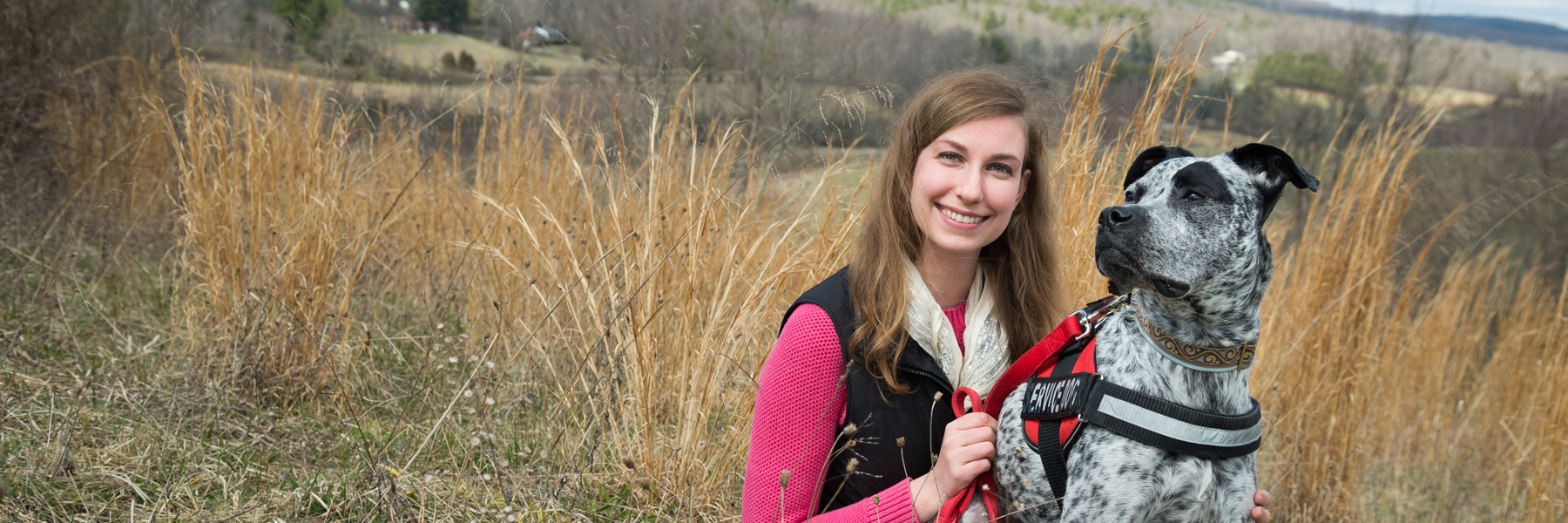Celiac Service Dog ‘Herald’ is Life-changing for Veterinary Student
As a third-year student at Virginia-Maryland College of Veterinary Medicine, Jess Benson was getting ready to start clinical rotations, pondering residency, looking for internships, and well on her way to fulfilling her dreams of becoming an equine practitioner on the East Coast, where she currently practices. The dream of veterinary school, however, almost never came to fruition because of celiac disease. “I’ve been sick most of my life, but I never received a definitive diagnosis,” says Jess. “The summer before vet school, I was getting sicker and sicker to the point where I was getting ready to defer my first year because I could barely get out of bed. I could barely move.” An endoscopy exam showed the disease had caused her intestinal lining to be completely destroyed. There was no absorptive surface for nutrients. Jess was eating six meals a day and continuing to lose weight. She was finally diagnosed with celiac disease on the second day of her first year of veterinary school.
Celiac disease, or gluten-sensitive enteropathy, is an autoimmune disorder characterized by an immune reaction to eating gluten, a protein found in wheat, barley, and rye. The classic symptoms include gastrointestinal problems such as chronic diarrhea, malabsorption of nutrients, anemia, loss of appetite, weight loss, and, among children, failure to grow normally. When exposed to gluten, an abnormal immune response may lead to the production of several different autoantibodies that can affect a number of different organs. Under a microscope, celiac disease manifests by blunting the villi of the small intestine. The villi are small fingerlike projections that line the intestinal tract and promote nutrient absorption. When attacked and damaged, nutrients cannot be absorbed properly in the body. Another sign of the disease is the infiltration of lymphocyte white blood cells into the intestinal lining. These immune cells, which would not normally be present, respond to the autoimmune signals from celiac disease. A strict, lifelong gluten-free diet is the only way to manage celiac disease, as there is currently no known cure. The gluten-free diet allows a break in the inflammatory cycle and gives the intestinal mucosa a chance to rest and heal. This improves symptoms and reduces the risk of complications.
After she was diagnosed, Jess immediately began to adhere to a strict, gluten-free diet, washed her hands frequently and was very careful to avoid cross-contamination. Even with these stringent precautions, she continued to get sick at weekly intervals and nearly ended up in the hospital several times from dehydration. She recalls, “It was to the point where I wasn’t able to eat out at restaurants anymore. I didn’t feel comfortable eating outside of my house. I’m young, in my 20s. Socializing, being out and eating out are the things that I did with people, and I kept thinking, ‘I can’t go through life like this.’ ”
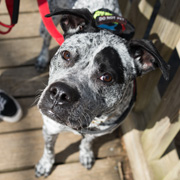
Meet Herald!
Breed: Mix (Australian Cattle Dog, Boxer, Pit Bull, Bulldog, White Swiss Shepherd)Sex: Male
Weight: 60lbs
Diet: Gluten-free
Title: Celiac Service Dog
Favorite Treat: Cream Cheese
Favorite Activity: Hiking
PHOTO BY KATIE LANDIS
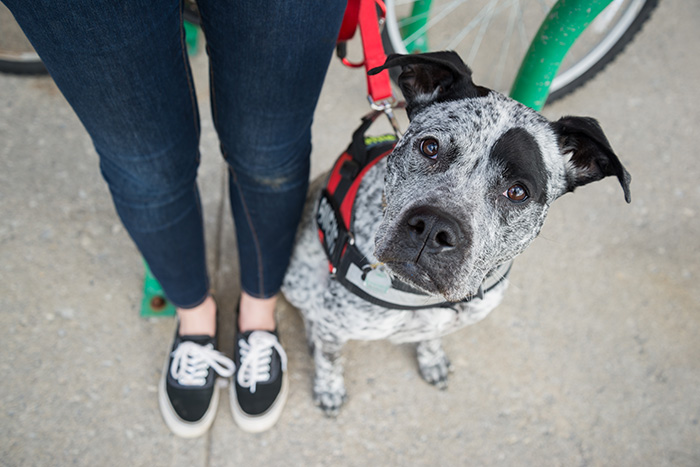
PHOTOS BY KATIE LANDIS
Jess Benson was finally diagnosed with celiac disease, or gluten-sensitive enteropathy, which is an autoimmune disorder. She now has Herald, a celiac service dog. Herald is the fifth celiac service dog ever trained, with only about 30 total worldwide now, and can detect gluten down to 1 part per million. After 1,000 hours of logged training, Jess can now touch a cracker, and Herald will alert. He can check plates, utensils, table tops and even search a complete room.
Being an animal-minded person, Jess began researching allergy-detection dogs and found a trainer out of Michigan who specializes in such an area. Dawn Scheu owns and operates Willow Celiac & Allergen Service Dogs. Dawn also has a specific type of celiac known as refractory celiac disease. This rare and terrible form of the disease has persistent malabsorptive symptoms that do not respond to a gluten-free diet. When first diagnosed, Dawn was given three years to live by her medical team. With a background in training scent detection dogs for her work in K-9 Search and Rescue, Dawn decided to try to train her own scent service dog to detect gluten. Now three and a half years later, Dawn’s doctors say she is the healthiest person with celiac that they know. Her scent service training has had a ripple effect as she has had a profound impact on many other people with celiac disease, as well as various other food sensitivities. Dawn reflects, “When I was diagnosed with a rare and fatal form of celiac called refractory celiac, I never dreamed it would end up being the most meaningful thing to ever happen to me. I grew and healed by training my own gluten detection dog. My only goal was to get better and live a full life. I did not plan on training service dogs for others, but people kept asking. I'm so glad I did. Watching my teams regain life and independence gives me more joy than I ever could have imagined. It makes me cry a lot of happy tears when a dog makes a life-saving ‘alert’ or a child is able to go out and eat a hamburger for the first time in their life. Something so simple that most people take for granted becomes a day full of those happy tears. Proud tears, tears full of life and joy. That makes every day, no matter how hard, worth every minute.”
Dawn had enormous influence on Jess’s search for the right puppy and in the arduous training that goes into transforming a puppy into a scent service dog. Scent work for a dog needs to be imprinted in memory from a very young age. Dawn recommended looking for a working dog breed in the 3- to 5-month-old range. Labradors and Golden Retrievers are typically breeds thought of for service dogs, but an allergy-detection dog needs to have specific characteristics. The dog needs to have enough drive and work ethic to pick up on gluten, but it also must have a balanced temperament to be calm enough for constant public access.
“Herald,” the abandoned puppy named by shelter workers after the beloved Christmas song (he and his littermates were found at Christmastime) is the unassuming rescue dog that would revolutionize Jess’s entire life. Jess found Herald through an online search of animal shelters. Herald had been taken from the shelter by a non-profit rescue group. When Jess traveled to a neighboring state to visit him, she immediately commenced putting him through a range of behavioral tests to check his aptitude to be a scent service dog. These included startle testing, physical sensitivity testing and scent testing. Regarding the scent test she says, “We hid pieces of hot dog all around the room. He found them all and then continued searching all corners of the room for the next thirty minutes. At that point, I thought he might be really good for this job!” Herald journeyed home as a six-month-old puppy and began the rigorous training to become a celiac service dog.
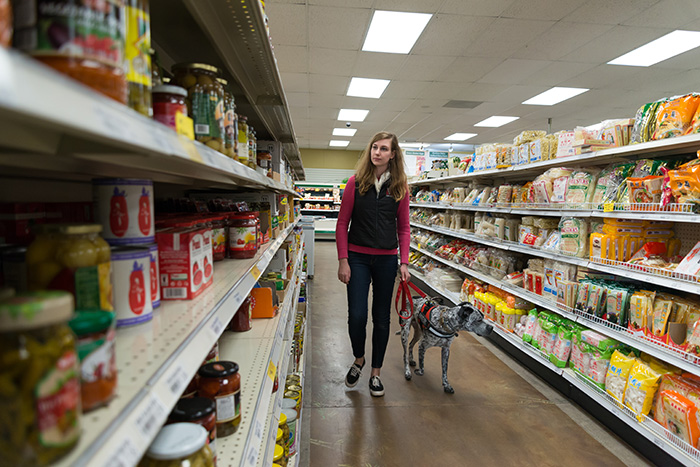
When his service vest comes out, Herald is all business.
Jess Benson's service dog Herald is only the fifth celiac service dog ever trained.
Gluten is nearly odorless, making it almost impossible to detect by smell, even for a dog’s highly-sensitive nose. It is also a large molecule. Because of this and the fact that it is such a faint scent, some dogs will lick the air near a scent to pull the molecules into the vomeronasal organ to process in addition to the olfactory processing. Herald’s training to detect this difficult molecule began with paint cans. Cans were lined up, with the very last paint can containing pure gluten. This trained Herald to have a “gluten alert,” which was to spin when he smelled gluten. The training moved on to smaller levels of gluten in salt shakers, and a “gluten-free alert” was added to his education. This training continued down to trace levels, with Herald being able to detect gluten down to 1 part per million. Since he’s been fully imprinted on scent, Herald will smell an item in question when given the “check it” command and is trained to sit when an item in question is gluten-free or spin if the item contains gluten. After 1,000 hours of logged training, Jess can now touch a cracker and Herald will alert. He can check plates, utensils, table tops and even search a complete room.

The job of keeping Jess healthy each and every day may seem daunting, but Herald knows his job through and through. He also knows when he’s off duty. He is a fun-loving, young, enthusiastic dog in general, but when his service vest comes out, Herald is all business. Jess says that at home, “Even if he’s upstairs sleeping and I say, ‘Herald, do you want to work?’ he’ll come running down to where his vest is and just dance until I put it on him.” Interestingly, Herald also maintains a gluten-free diet with Jess. He cannot consume gluten, then lick her or something she touches or she could be made vulnerable to the effects of gluten by proxy.
Herald is the fifth celiac service dog ever trained, with only about 30 total worldwide at this point. In addition to celiac service dogs, there are other scent service dogs that are trained to smell additional allergens, including red dye 40, dairy, cashews and peanuts. These dogs have all had as much impact on their owners’ lives as Herald has had on Jess’s. Trainer Dawn notes, “He and Jess are so dedicated and loyal to each other that they make a true team. Not a dog and a handler, but a team, working together to meet each others’ needs. Always putting the other first. This is rare and such a special gift. I still think of Jess in my mind as that skinny little college girl. When Jess posts a rare photo of herself on Facebook I have to smile. It's so nice to see shining bright eyes, color in her face and healthy cheek bones. I know Herald is working.” Having gained 40 much-needed pounds, Jess says that she feels so much healthier. She has more energy, more overall color in her appearance, and, most importantly, is not getting sick anymore. “That was only the second Thanksgiving in my life that I hadn’t gotten sick. Because of Herald. Because he was able to check everything.” In case there was any doubt left as to the importance Herald has had on her life, Jess emphasizes with deep gratitude, “There is no way I could have continued going to vet school without Herald. He is my life saver. Literally.”
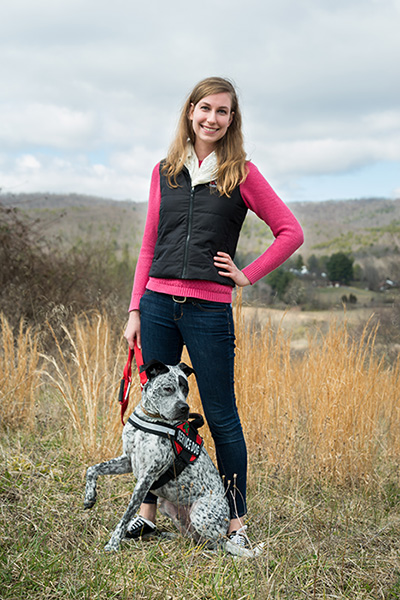
Jess Benson is finally thriving after being diagnosed with an autoimmune disease, thanks to her celiac service dog, Herald. Herald knows his job through and through. When he’s off duty, he is a fun-loving, young, enthusiastic dog, but when his service vest comes out, Herald is all business, keeping Jess healthy each and every day.
PHOTO BY KATIE LANDIS

by Emily Smith, MS,
Platinum Performance®
